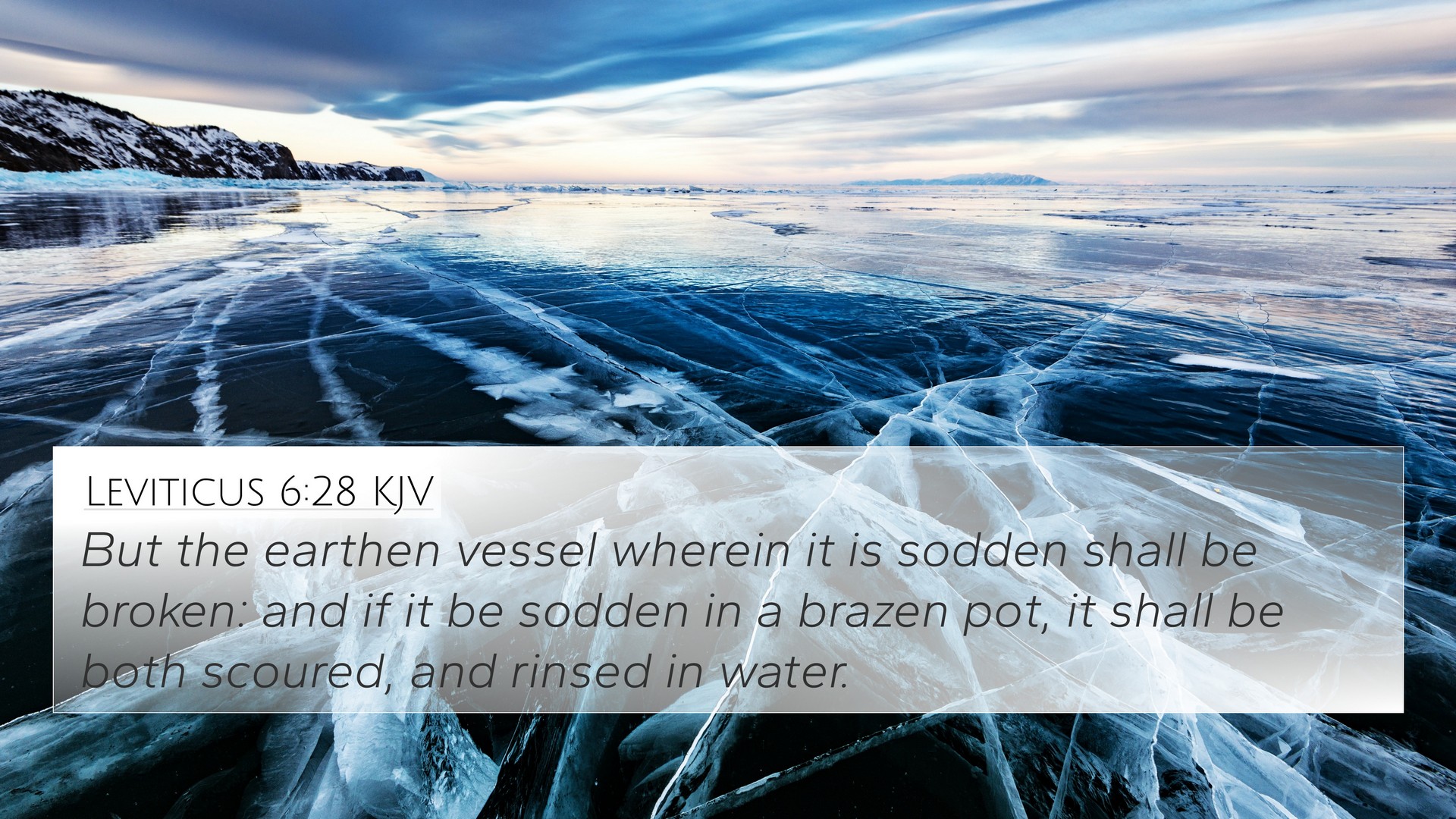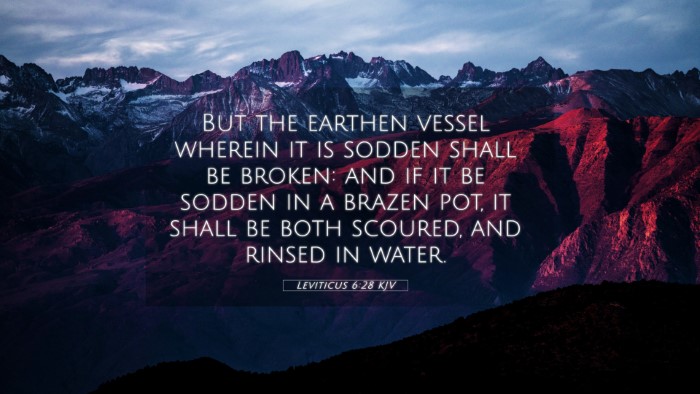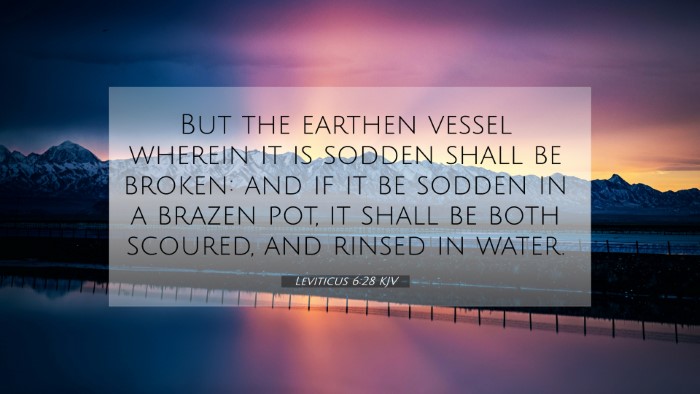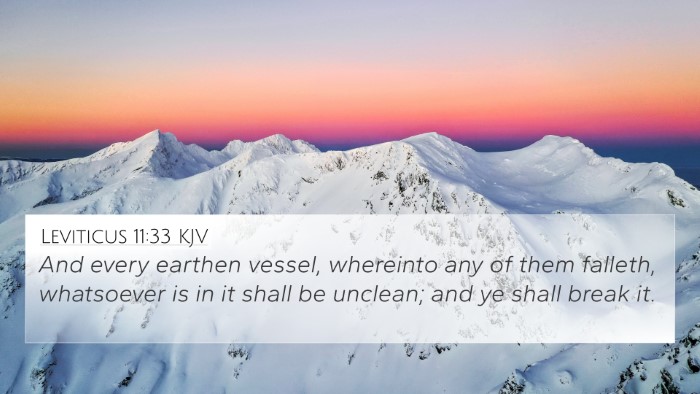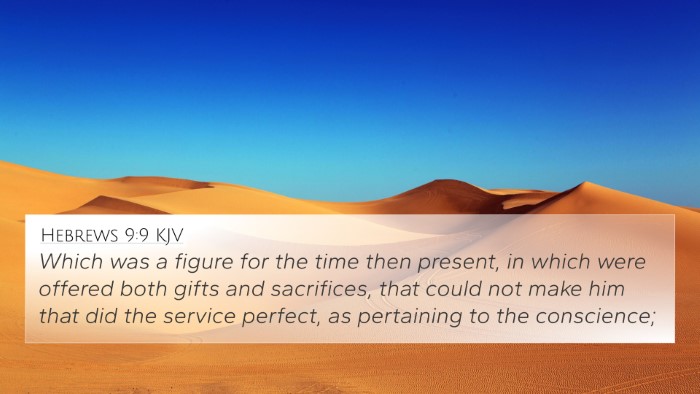Understanding Leviticus 6:28
Leviticus 6:28 states: "But the earthen vessel in which it is boiled shall be broken; and if it be boiled in a brazen vessel, it shall be both scoured, and rinsed in water." This verse highlights specific instructions regarding the handling of meat offerings and emphasizes the importance of purity and holiness in sacrificial practices.
Verse Meaning and Commentary Insights
The verse can be understood through various lenses provided by public domain commentaries such as those by Matthew Henry, Albert Barnes, and Adam Clarke. Here are some key insights:
-
Matthew Henry's Commentary:
Henry notes that the instructions serve to protect the sanctity of offerings. The careful handling of sacrificial materials, especially in how they are contained or cooked, reflects an underlying principle of maintaining holiness in worship practices.
-
Albert Barnes' Notes:
Barnes emphasizes the significance of the earthen vessel being broken. This illustrates that which is unclean or irreverent should not be used in sacred matters, highlighting the call for holiness even in physical items used in worship. He connects this to themes of purification in the rituals.
-
Adam Clarke's Commentary:
Clarke identifies the practical implications of boiling in different types of vessels. He suggests that the type of vessel affects the leftover residue, tying the physical act to spiritual implications about the necessity of thorough cleansing to maintain purity in rituals.
Cross-References and Thematic Connections
Leviticus 6:28 connects with several other Bible verses that illustrate themes of holiness, sacrificial practices, and purity:
-
Exodus 30:17-21: Discusses the instructions for washing at the bronze laver, reinforcing the theme of purification.
-
1 Corinthians 3:13: The metaphor of works being tested by fire parallels the themes of worthiness and purity in offerings.
-
Hebrews 9:13-14: Talks about the blood of animals and how much more the blood of Christ purifies, linking Old Testament rituals to New Testament principles.
-
Matthew 5:13: "You are the salt of the earth," linking the preservation and purification themes, akin to the importance of context in which sacrifices are made.
-
1 Peter 2:5: Believers as living stones, connected to the concept of being a holy priesthood, indicative of the sacred role played in worship, akin to offerings.
-
Romans 12:1: The act of presenting our bodies as living sacrifices reflects the essence of offerings examined in Leviticus, promoting pure worship.
-
John 17:17: "Sanctify them in the truth," which connects to the cleansing that occurs when following God’s commandments as discussed in the Levitical laws.
Comparative Bible Verse Analysis
When we analyze Leviticus 6:28 in light of cross-referencing Biblical texts, several important connections can be made:
-
The instruction to specifically handle offerings draws a parallel to New Testament teachings on the seriousness of one's approach to worship.
-
The connection between Old Testament laws and New Testament applications highlights continuity in divine expectations of purity.
-
Themes of obedience, sacrifice, and the nature of God's requirements transcend testamental boundaries.
How to Use Bible Cross-References for Deeper Understanding
Engaging with the cross-reference Bible study can enhance one's understanding of verses like Leviticus 6:28. Here are tools and methods:
-
Bible Concordance: Helps locate keywords and find verses related to similar themes or subjects.
-
Bible Cross-Reference Guide: Provides organized listings of verses related to specific topics or keywords.
-
Cross-Referencing Bible Study: This method involves looking at verses that provide additional context or commentary on a given scripture.
-
Comprehensive Bible Cross-Reference Materials: Various resources such as study Bibles and online databases give insights and interlinking references.
Final Thoughts
Leviticus 6:28 is a profound verse that invites readers to explore the detailed nature of God's expectations about purity in worship and sacrifice. By utilizing cross-references and comparative Bible verse analysis, one can appreciate not only the meaning of this specific verse but also how it interacts within the broader narrative of Scripture.
